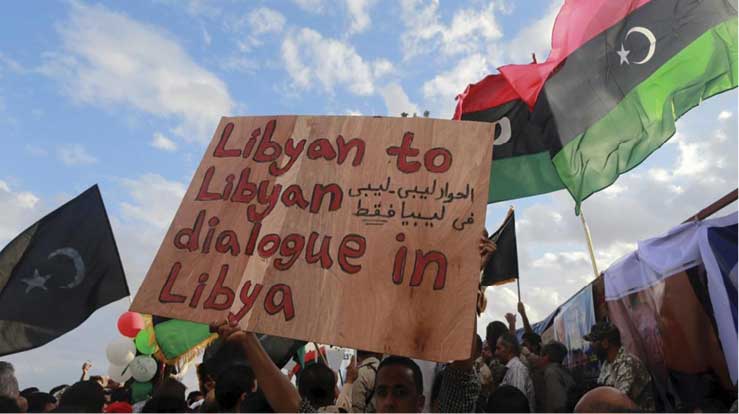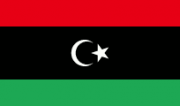
In 2016, we submitted to the UN Mechanisms 3 communications regarding 2 individuals.

LIBYA
 Our Concerns
Our Concerns
- Persistent violations of international humanitarian law and human rights, including summary executions, abduction, torture, enforced disappearance, and secret detention, as well as indiscriminate attacks against civilians, some of which amount to war crimes;
- Absence of the rule of law;
- Lack of accountability for perpetrators of war crimes and gross human rights violations, who continue to operate with complete impunity.
 Recommendations
Recommendations
- Ensure compliance, by all parties to the conflict, with the principles of international humanitarian law and international human rights law, and ensure the protection of civilians and civilian objects;
- Open independent and impartial investigations into crimes committed by all parties to the conflict;
- Prosecute perpetrator of severe violations of international humanitarian law and international human rights law and put an end to impunity;
- Implement the recommendations of the Office of the High Commissioner for Human Rights.
 Upcoming
Upcoming
Six years after the beginning of the revolution, Libya remains entrenched in a complex, multifaceted conflict between competing governments and militias over political power and national resources. The many impediments to peace and State-building derive from the deep fractures within the Libyan society and political landscape, as well as from the foreign interventions in the conflict, fuelling existing antagonisms.
The UN-sponsored Skhirat agreement, signed on 17 December 2015, which provides for the creation of a new Government of National Accord (GNA) and a Presidential Council, failed to solve the political crisis as neither the Tripoli-based government in the west nor the Tobruk-based authorities in the east are willing to recognise the GNA’s authority. As soon as the GNA’s creation was announced on 19 January 2016, it faced stern opposition from both competing governments, which accused it of unequal representation among the country’s factions and of being “imposed from outside”. Originally based in Tunis, the GNA was only able to establish itself in Tripoli in mid-March 2016, after having arrived by sea, since its opponents blocked access to airports and warned them not to enter the capital. In this context, the UN-backed government established its headquarters in a heavily guarded naval base in Tripoli.
The GNA’s Presidential Council, headed by Prime Minister Fayez Sarraj, is facing multiple challenges, including a lack of effective control over its militias and difficulties in building a consensus between stakeholders to achieve unity and to stabilise the country. Moreover, the Tobruk-based Parliament rejected the Presidential Council’s authority on two separate occasions, voting once on 25 January 2016 and then again on 22 August 2016. In doing so, it requested that the Presidential Council be restructured and that the Skhirat agreement’s provisions on the distribution of key sovereign governmental positions be repealed. In September, militias under the command of General Haftar and aligned with the Tobruk-based government forcibly seized all major ports of oil exportations that had just been put under the GNA’s control. In parallel, Khalifa Al Ghweil, the leader of the Tripoli-based government, had stated in early April 2016, that he refused to step down or relinquish his National Salvation Government’s power in favour of the GNA. In mid-October, he seized the GNA’s key administrative offices in the capital and declared the re-establishment of his government, before calling on its rival Tobruk-based government to strike a deal against the GNA.
Furthermore, external military interventions continue to fuel existing confusion and animosity. In July 2016, the death of three French intelligence officers near Benghazi pressed President François Hollande to confirm his country’s military cooperation in support of General Haftar, whose militias have been fighting both Al Ghweil’s government and the GNA. This announcement was followed by large protests in Tripoli against foreign interventions. The GNA has also formally condemned France’s involvement, deeming it a breach of Libya’s sovereignty, as well as a factor contributing to the further destabilisation of the country. Furthermore, in November 2016, the Libyan media released audio recordings suggesting direct cooperation between US forces – engaged under NATO command – and General Haftar in order to fight rebels in the eastern part of the country.
In the midst of the crisis, the Islamic State (IS) – having already carried out the most devastating terrorist attack in the country’s history in Zliten in January – also took advantage of the political confusion to seize more territory around Misrata in May. The city of Sirte, an IS stronghold, was reclaimed by GNA forces in December 2016, after months of fighting and the support of US airstrikes on the city.

Persistent violations of international humanitarian law and human rights
The failure of the different authorities to maintain security and uphold basic rights and freedoms has created a breeding ground for severe violations of international humanitarian law and human rights. Abuses continued to occur this year, including numerous unlawful killings, most notably in the form of executions of individuals that had been abducted and secretly detained or of those voicing dissent. Furthermore, as the different governments fail to exercise full judicial control over arrests carried out by militias, subsequent detentions often fall outside the framework of the law. As a result, individuals are frequently detained for long periods without any judicial review and numerous cases of enforced disappearances are on the rise, particularly of persons being held in secret or unrecognised facilities. Torture also remains widespread, commonly resulting in the death of detainees.
This year, Alkarama documented several cases of severe violations committed by the Special Deterrence Forces (RADA forces), which pledged allegiance to the GNA. However, since the latter does not exercise effective judicial control over these forces, numerous violations, including abductions, secret detentions and torture, are committed with complete impunity. On 11 October 2016, Alkarama sent an urgent appeal to the UN Working Group on Arbitrary Detention (WGAD) regarding the case of Moustafa Abdelkhalek Al Darsi, a 48-year-old Libyan citizen who was abducted on 9 January 2016 in Zliten by members of the RADA forces in plainclothes. Since his abduction, his family has been able to see him only once in May 2016, through a glass screen at Mitiga military base, 11 kilometres east of Tripoli, in which several detention facilities have been established by different militias. To date, Mr Al Darsi is still detained arbitrarily and has never been presented before a judicial authority.
Similarly, on 12 November 2016, Alkarama sent an urgent appeal to the UN Working Group on Enforced or Involuntary Disappearances on the case of Nader Snoussi Ali Al Omrani, a 44-year-old religious scholar abducted on 6 October 2016 in Tripoli by the RADA Forces. According to the testimony of a young member of the RADA Forces, members of this force had summarily executed the religious scholar. To date, the Office of the Public Prosecutor did not open any investigation into the facts.

Lack of accountability for perpetrators of human rights violations
In light of the foregoing, civilians in Libya have to deal with multiple authorities, each with parallel security and political institutions. In addition to three parallel governments, the myriad of militias, which have proven to be unstable in their allegiances to the various political authorities, sometimes unofficially taking on law enforcement operations across the country. In this context, it is difficult to identify perpetrators of human rights violations and to hold them accountable.
The rule of law is largely absent in the eastern part of the country since the Tobruk authorities are unable to exercise control over all militias, including those who have pledged allegiance to them, as well as those under General Haftar’s command. This situation has created an alarming accountability vacuum, all the more concerning in light of the fact that these militias have been accused of committing war crimes. In July 2016, the bodies of 14 victims of extrajudicial executions were brought to the Benghazi hospital after having been found in area’s under Haftar’s control. The UN Special Representative and Head of the United Nations Support Mission in Libya, Martin Kobler, qualified the killings as a war crime. He called for an investigation and for the prosecution of those responsible, neither of which have occurred to date.
Another example of the lack of accountability for gross human rights violations is the case of Suleiman Awad Zoubi, a retired judge and former member of the Libyan General National Congress, who was released on 4 September 2016, after two years of arbitrary detention. Following his abduction in July 2014 by Zintan militias, Alkarama sent an urgent appeal to the WGAD emphasising that he was held in solitary confinement and subjected to torture and ill-treatment. However, to date, the perpetrators remain at large and no one has been held accountable.

NEW LAW ON CYBERCRIMES INFRINGES FREEDOM OF
EXPRESSION
In March 2015, the UN Office of the High Commission for Human Rights (OHCHR) dispatched a mission to investigate violations of international human rights law committed in Libya since the beginning of 2014. In October 2015, Alkarama submitted a report to the investigation team documenting serious cases of violations committed by various actors as well as gathering testimonies from survivors and witnesses collected by our research team on the ground. On 15 February 2016, the OHCHR published a report on its findings.
The OHCHR report, which was presented to the Human Rights Council (HRC) during its 31st session in March 2016, identified a pattern of violations and abuses – which “may amount to war crimes” – committed by major armed groups, including “Operation Dignity”, comprising militias aligned with General Haftar; Shura Councils opposed to “Operation Dignity”; “Libya Dawn” and a coalition of armed groups opposed to the latter; as well as tribal armed groups and groups which pledged allegiance to IS.
In its report, the OHCHR deplored that these abuses were taking place in a complete climate of impunity and formulated several recommendations “to the Libyan government” to fight impunity and to strengthen and reform the justice sector. However, given the current situation, with different competing political authorities and the challenges faced by the GNA, the implementation of such recommendations will be extremely difficult.
Moreover, the report recommends urgent action to stop the proliferation of armed groups through disarmament, demobilisation, and reintegration, as well as the establishment of a vetting programme to prevent the recruitment of individuals responsible for human rights violations in a future unified army. The OHCHR also calls upon the authorities to “resume State-building activities as soon as feasible, with a particular focus on building inclusive institutions, effective law enforcement agencies, an independent and impartial justice sector and a unified armed force operating under civilian control”.
However, six months after the issuance of the report, the Deputy High Commissioner for Human Rights, Kate Gilmore, affirmed – during the 33rd session of the HRC – that the situation had not improved and that warring factions continued to “show little regard for civilians”. In view of the distressing situation on the ground with “little hope of resolution in immediate sight”, she called for the establishment of an independent expert on Libya, to report on the situation of human rights and on progress made towards accountability.